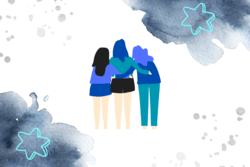Learning to Lead Prayers, and My Community
I was raised in an Orthodox Jewish home and attended an Orthodox school until the eighth grade. There was a great deal I enjoyed about my school. I loved learning about my history and traditions. I learned to read, write, and speak Hebrew. I was able to celebrate the holidays and Shabbat together with my friends and classmates. Today, I feel comfortable in any synagogue in any place in the world and can follow along with the prayer service using any siddur. As a result of all of this, I felt—and continue to feel—deeply connected to the Jewish community. I feel grateful for my Jewish education and am a proud Jew.
But there was one thing that I did not like so much about my school, and that thing was the primary reason I chose to leave and attend a secular high school: the reduced role of women. I never really paid much attention to it until sixth grade, when boys began to learn to chant the Torah and girls did not. We also started Jewish law classes taught by rabbis who were trained in ultra-Orthodox seminaries. In these classes, the halakhic differences between men and women were highlighted. For example, women light Shabbat candles on Friday night. Men put on tefillin every morning. Men led the prayer service. Women did not.
When I asked my Jewish law teacher why this was, he explained that a women’s voice would distract men from their prayers. That answer puzzled me. I had always thought that the voice of women—both literally and figuratively—made the prayer service even more meaningful. It was at that moment that I knew that I needed to find my own place within my beloved faith, one in which women were valued to the same extent as men. I also knew that I had to carve out that place for myself, and I started to do so with the preparations for my Bat Mitzvah.
While most of the girls in my school simply gave a d’var Torah and had a dance party, I wanted my bat mitzvah to be a very public statement of my commitment to gender equality within Orthodox Judaism. So, I asked my father to teach me how to read my Torah portion. I sat with my father for hours every week, and he taught me how to sing each note. With my newfound knowledge, I decided to teach myself to chant my entire Torah portion, which I read on the Shabbat morning of my bat mitzvah in front of my whole community. I also chanted the Haftarah and gave a d’var Torah. My d’var Torah focused on the fact that my Torah portion was the only one in the entire Torah named for a woman. That woman was Sarah, the matriarch of our people. Although I got very little recognition at my school for leading even more than most boys did, I felt really proud of myself that I showed my whole community that girls could contribute in the same way boys could. I also gained a new sense of confidence that I have with me to this very day.
My journey continued at my summer camp, a Conservative Jewish camp in Colorado. There, women and men participated in prayer services equally. I loved it! I loved hearing the combined voices of men and women, girls and boys, singing together and welcoming in Shabbat, leading the Grace After Meals, and leading the Havdalah service. I loved seeing the female campers—even the youngest ones—take leadership roles within the service. I loved teaching the girls prayers and encouraging them to volunteer to participate in religious observance. Like my own confidence had grown at my bat mitzvah, I could see their confidence grow as well. I also enjoyed witnessing the boys’ reaction to the girls leading. Some of the boys were from traditional backgrounds like my own and did not expect a girl to take on a primary role in the services. I really think that seeing the girls take on these important duties caused the boys to have a deeper respect and admiration for the female campers. This, to me, was eye-opening and extremely meaningful.
I took these lessons back with me to my life as a student. If leading prayers caused me to feel empowered as a woman, then I should focus on taking on more leadership roles. In school projects. At the science lab at which I volunteer each week. At my camp. Within my family. In other aspects of life. Since then, I have helped lead a backpacking trip for twelve fifth and sixth graders. I was looked up to by these students, and counted on for providing food, water, shelter, and some medical aid (after completing my wilderness first aid course). Although this trip was challenging at times, I ended it feeling empowered and proud of what I had accomplished. The more leadership roles I took on, and the more I spoke with my own voice, the more confident I became.
My confidence-building journey all began in middle school when one of my rabbis told me that girls could not lead the prayers. I led prayers and moved on from there. I am now in a much happier place.
This piece was written as part of JWA’s Rising Voices Fellowship.







